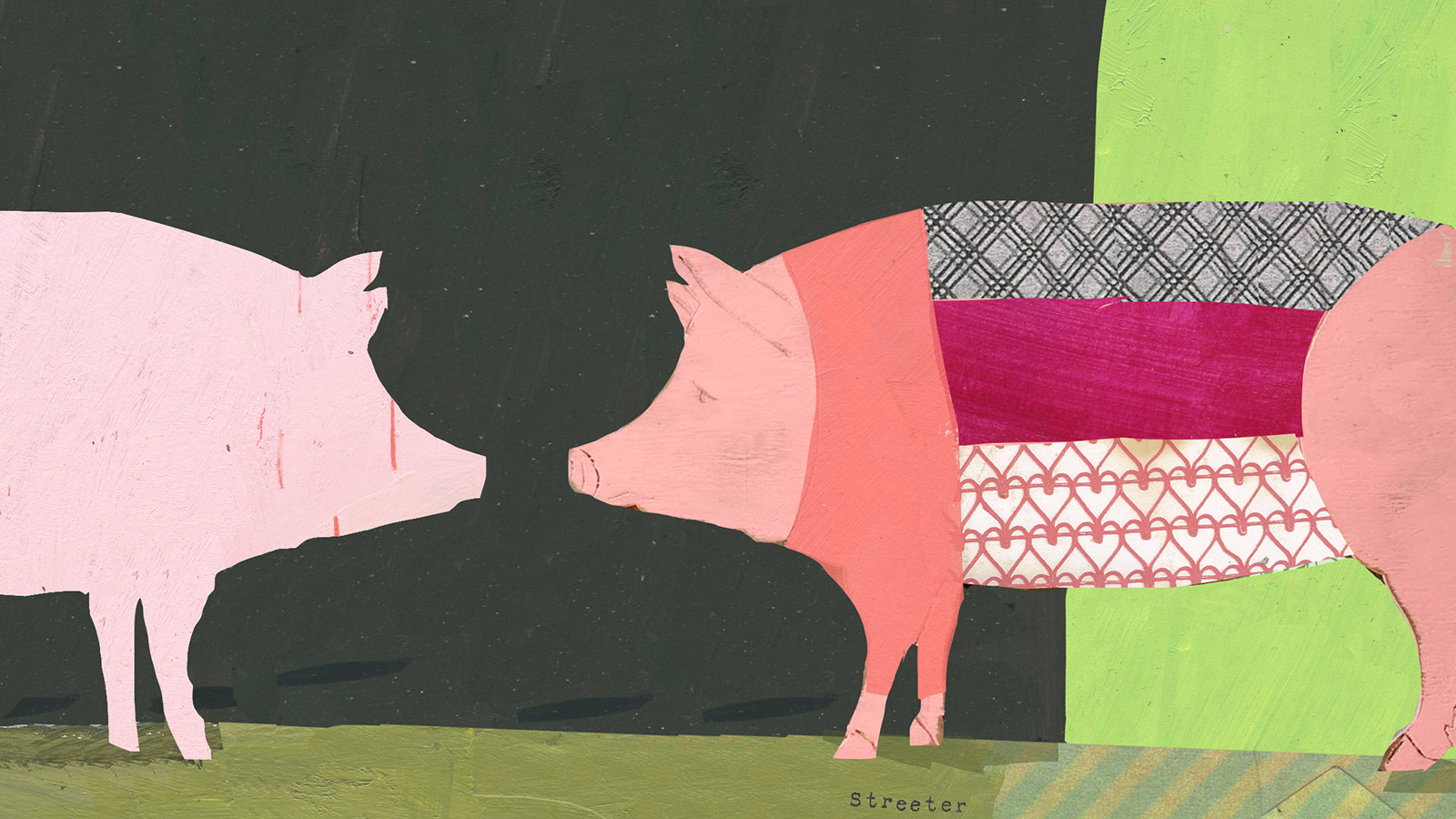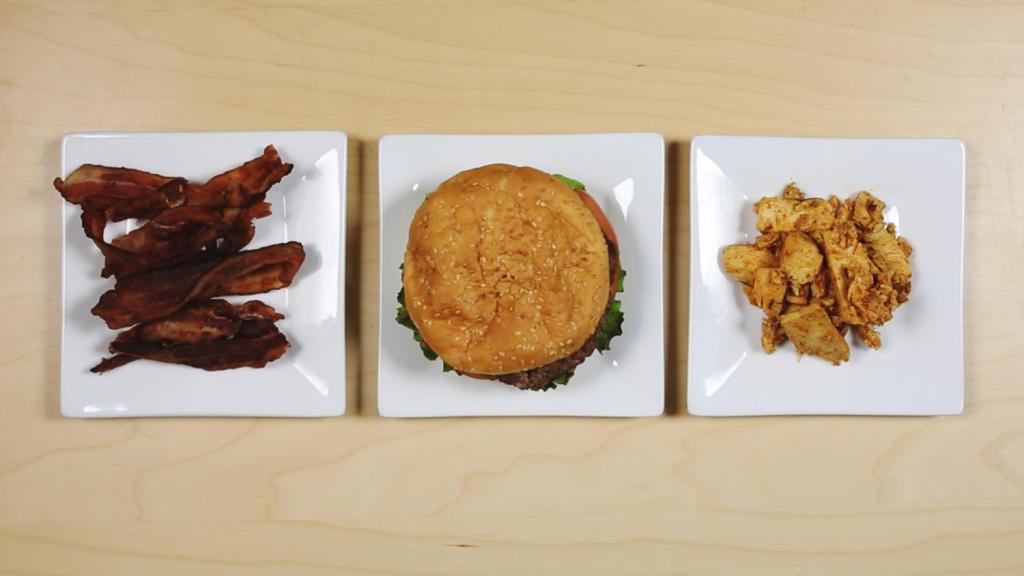Where are the philosophers arguing that eating meat is moral?
When I started researching this piece, I’d already read a lot of arguments against meat, but I hadn’t seen a serious philosophical defense of carnivores. So I started asking around. I asked academics, meat industry representatives, and farmers: Who was the philosophical counterweight to Peter Singer?
In 1975, Singer wrote Animal Liberation, which launched the modern animal rights movement with its argument that causing animal suffering is immoral. There are plenty of other arguments against eating animals besides Singer’s, going back to the ancient Greeks and Hindus. There are even arguments that Christianity contains a mandate for vegetarianism. Matthew Scully’s Dominion argues against animal suffering; Scully rejects Singer’s utilitarian assertion that humans and animals are equal but says that, since God gave people “dominion over the fish of the sea and the fowl of the air, and over the cattle, and over all the earth,” so we have a responsibility to care for them and show them mercy.
The arguments against eating animals are pretty convincing. But surely, I thought, there were also intellectuals making convincing counterarguments. Right? Nope. Not really.
There is the Cartesian idea that animals are unfeeling machines, incapable of suffering — but I just wasn’t buying that. It’s clear that animals have an aversive response to pain, and careful, well-respected scientists are saying that animals are probably capable of feeling and consciousness. Once we admit even the possibility that animals are sentient, the ethical game is on: It doesn’t matter that an animal is just an animal; if you’re against suffering and you agree animals can feel pain, it’s pretty hard to justify eating them. (Of course, the further you get from humans the harder it is to judge — plants may be sentient in a totally alien way! Singer says we can stop caring somewhere between a shrimp and oyster.)
My enquiries didn’t turn up any sophisticated defense of meat. Certainly there are a few people here and there making arguments around the edges, but nothing that looked to me like a serious challenge to Singer. In fact, the lack of philosophical work to justify meat eating is so extreme that people kept referring me not to scholarly publications, but to an essay contest that the New York Times held back in 2012. Ariel Kaminer organized that contest after noticing the same gaping hole in the philosophical literature that I’d stumbled upon. Vegetarians have claimed the ethical high ground with book after book and, Kaminer wrote:
In response, those who love meat have had surprisingly little to say. They say, of course, that, well, they love meat or that meat is deeply ingrained in our habit or culture or cuisine or that it’s nutritious or that it’s just part of the natural order … But few have tried to answer the fundamental ethical issue: Whether it is right to eat animals in the first place, at least when human survival is not at stake.
The winner of that contest, Jay Bost, didn’t take it much farther than that, basically arguing that “meat is just part of the natural order,” because animals are an integral part of the food web. That’s a start, but I’d want a lot more than a 600-word essay to flesh out the idea and respond to the obvious criticisms — since almost all the animals we eat are far removed from natural food webs, it’s still basically a prescription for veganism. Plus, where do you draw the line on what’s natural?
[grist-related-series]
I found several beginnings of arguments like this — no real philosophical shelter for a meat eater, but a few foundational observations that you might build something upon if you carefully thought through all the implications.
Animal welfare expert Temple Grandin offered one potential plank for building a defense of meat eating. “We’ve gotta give animals a life worth living,” she told me. Later in the interview, she reminded me that most farm animals wouldn’t have a life at all if no one ate meat. Combine these points and you could argue that it’s better to have a life worth living than no life at all — even if it ends with slaughter and consumption.
When I bounced this argument off the ethicist Paul Thompson, he said, “That may be a defensible position, but a philosopher should also be prepared to apply it to humans.”
Right. It’s hard to limit the “a life worth living is better than no life at all” argument to farm animals. Using the same argument we might raise children for the purpose of producing organs: As long as they were well cared for, ignorant of their fate, and painlessly slaughtered, you could say they had a life worth living. The clone gets a (short) life, a dying girl get a new heart, everyone wins! It’s rationally consistent, but certainly doesn’t feel right to me.
Perhaps some brilliant philosopher will develop these points, but, since I am not one of those, I was left with the conclusion that the vegans were right. Oddly, however, that didn’t make me think twice about laying sliced turkey on my sandwich the next day. I was convinced on a rational level, but not in an embodied, visceral way.
“Animal Liberation is one of those rare books that demand that you either defend the way you live or change it,” Michael Pollan once wrote. I know what he means — when I first read it, I felt battered and stupefied by the horrors of animal suffering that Singer paraded before me. Nevertheless, despite my inability to muster a defense for my meat eating, I didn’t change my way of life. Pollan didn’t, either: His piece is set up as a stunt — he’s reading Animal Liberation while eating rib-eye in a steakhouse. And, though Pollan finds himself agreeing with Singer, he has no problem finishing his steak.
I tend to think of rational argument as a powerful force, certainly more powerful than the trivial pleasure of eating meat. But it turns out that’s backwards: Rational morality tugs at us with the slenderest of threads, while meat pulls with the thick-twined chords of culture, tradition, pleasure, the flow of the crowd, and physical yearning — and it pulls at us three times a day. Thousands, convinced by Singer and the like, become vegetarians for moral reasons. And then most of those thousands start eating meat again. Vaclav Smil notes: “Prevalence of all forms of ‘vegetarianism’ is no higher than 2–4 percent in any Western society and that long-term (at least a decade) or life-long adherence to solely plant-based diets is less than 1 percent.” As the psychologist Hal Herzog told Grist’s Katie Herzog in this podcast, “It’s the single biggest failure of the animal rights movement.”
How do we deal with this? Some people just shrug and say, “Whatever, animals are different, it’s OK to kill them.” I can’t quite bring myself to do that, because I value rational consistency. And yet, I don’t feel immoral when I eat meat — I actually feel pretty good.
Whenever you have lots of people agreeing in principle to a goal that is impossible for most to achieve in practice, you have something resembling religion. Religions are all about setting standards that most people will never live up to. And Thompson thinks they have something to teach us on this issue.
Thompson’s solution is to treat vegetarianism the way religious traditions treat virtues. Christians strive to love their neighbors, but they don’t say that people who fail to reach Jesus-level self-sacrifice are immoral. Buddhists strive for detachment, but they don’t flagellate themselves when they fail to achieve it.
Thompson suggests that we should strive to do better by animals, but that doesn’t mean we should condemn ourselves for eating meat. There are lots of cases like this, he told me. “Some people are going to take these issues up in a way that other people would find really difficult,” Thompson said. “For instance, we all respect Mother Theresa for taking on amazing burdens, but we don’t say that you are evil for not doing it.”
This makes sense to me. Louis CK can make a pretty solid argument that people who have enough money to buy a nice car (or to spend time reading long essays about meat philosophy) should be donating 90 percent of their income to the poor.
And yet most of us don’t give up our luxuries. By Thompson’s reasoning, that doesn’t make us immoral. In fact, he says, it’s just wrong to condemn people who eat meat. When people rise out of extreme poverty, that is, when they start earning $2.60 a day, they almost invariably spend that newfound money on animal protein: milk, meat, or eggs. Now, you might roll your eyes and say that of course the desperate should be excused from the moral obligation — but wait. As Thompson writes in his book, From Field to Fork: Food Ethics for Everyone:
[T]his response misses my point. Excuses apply in extenuating circumstances, but the logic of excuses implies that the action itself is still morally wrong. A poor person might be excused for stealing a loaf of bread. Theft might be excused when a poor person’s situation takes a turn for the worse, but in the case at hand, their situation has taken a turn toward the better. Under modestly improved circumstances, the extremely poor add a little meat, milk, or eggs into their diet. My claim is that there is something curious with a moral system that reclassifies legally and traditionally sanctioned conduct of people at the utter margins of society as something that needs to be excused.
Is it morally wrong for a hungry child in India to eat an egg? This isn’t just a thought experiment — it’s a real controversy. It’s not enough to wave it off by saying it’s easy to provide vegan alternatives, because those alternative just don’t exist for many people. Often, the cheapest high-quality protein available to the poor comes from animals. Thompson’s point is that allowing people to access that protein should be moral, not just an excusable lapse.
If we accept Thompson’s formulation (and I’m inclined to), it lets us stop wringing our hands over our hypocrisy and strive to improve conditions for animals. That’s what Temple Grandin does. She didn’t have much patience for my philosophical questions. Instead, she is focused on the realistic changes that will give animals better lives. And as I talked to her, she served up surprise after surprise. Many of the elements in confined animal feeding operations (CAFOs) that people find most abhorrent, she said, may be fine from the animal’s perspective. For instance, consider egg-laying hens: What’s better for them — an open barn or stacked cages? Small battery cages, with several hens packed inside each, are bad news, according to Grandin, but enriched cages are a really good alternative.
“There are objective ways to measure a hen’s motivation to get something she wants — like a private nest box,” Grandin told me. “How long is she willing to not eat to get it, or how heavy a door will she push to get it? How many times will she push a switch to get it? A private nest box is something she wants, because in the wild she has an instinct to hide in the bushes so that a fox doesn’t get [her eggs]. Give her some pieces of plastic to hang down that she can hide behind. Give her a little piece of astroturf to lay [her eggs] on. Give her a perch, and a piece of plastic to scratch on, and at least enough cage height so she can walk normally. I’m gonna call that apartment living for chickens. Do they need natural elements? Being outside? Science can’t answer that. I mean, there are people in New York that hardly go outside.”
I pressed her: Can’t you use those same objective measurement techniques to see how badly the hens want to go outside and scratch for bugs?
“Well you can,” Grandin said, “and the motivation is pretty weak compared to something like the nest box, which is hardwired. Take dust bathing. For a hen dust bathing is nice to do, but it’s kind of like, yes, it’s nice to have a fancy hotel room, but the EconoLodge will do too.”
And in fact, the free-range system that I would instinctively choose for chickens may be worse than an enriched cage — because the birds get sick and injured a lot more. And laying hens, unlike meat chickens, are pretty nasty about setting up pecking orders. As Thompson observes in his book, “This is well and good in the flocks of 10 to 20 birds, as might be observed among wild jungle fowl, and it is probably tolerable in a flock of 40 to 60 birds that might have been seen on a typical farmstead in 1900 … But a cage-free/ free-range commercial egg barn will have between 150,000 to 500,000 hens occupying the same space. If you are a hen at the bottom end of the pecking order in an environment like that, you are going to get pecked. A lot.”
Even small farms with pastured hens that produce $9-a-dozen eggs often have hundreds of birds, which means the most submissive hens are going to get beat up. I certainly prefer Joel Salatin’s 400-bird Eggmobile on lush grass, because to my human eyes it’s beautiful — and chicken cages look horrible. But I have real doubt as to what’s better from the chicken’s perspective.
There are a lot of counterintuitive things like this when it comes to animal farming (here’s our Q&A in full). So I asked Grandin how we should feel about animal agriculture in the United States as it’s currently practiced: Do these animals really have a life worth living?
It varies greatly, she said, but some CAFOs really are good. “I think cattle done right have a decent life,” she said. I couldn’t get her to give a simple thumbs up or down to chicken or pork CAFOs.
Talking to Grandin didn’t make me want to go stock up on corn-fed beef, but it did significantly soften my (negative) feelings about industrial animal production. And talking to Thompson made me realize that I was willing to compromise the needs of animals for the needs of humans if they come into direct conflict. In that way I’m a speciesist — I have an unshakeable favoritism for humans. Perhaps it’s irrational, but I really want that little girl in India to get her egg, even if it means hens suffer, even if there’s a good vegan alternative for a slightly higher cost.
Perhaps there’s a philosophical argument to be made in defense of killing animals, but no one has spelled that out in a way that I found convincing. Does this mean that we should join the vegans?
I think the answer is yes, but in a very limited way — in the same way that we all should take vows of poverty and stop thinking impure thoughts. Ending deaths and suffering is a worthy moral goal for those of us who have the wealth to make choices. But saying that it’s wrong and immoral to eat meat is just too absolutist. I mean, even the Dalai Lama, who says vegetarianism is preferable, eats meat twice a week.
The binary, good-or-evil view of meat is pragmatically counterproductive — the black and white strategy hasn’t gotten many people to become vegan. Instead, let’s focus on giving farm animals a life worth living.



